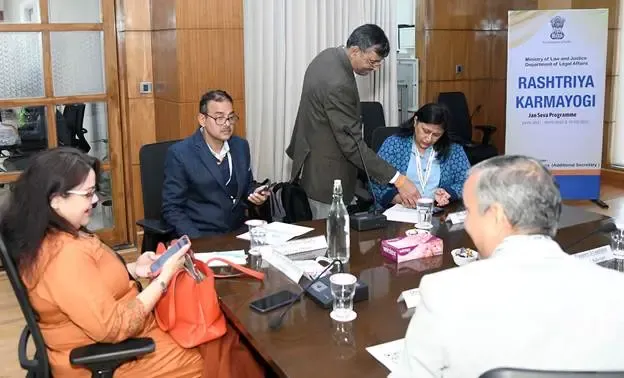Central Government Employees Receive Guidance on Selfless Service

Synopsis
Key Takeaways
- Citizen-Centric Governance: Emphasizing a service-oriented approach.
- Rashtriya Karmyogi Jan Seva Programme: Aims to inspire public service.
- Seva-Bhav: Aligning personal ambitions with national goals.
- Interactive Learning: Utilizing technology for reflection.
- Karmayogi Mindset: Fostering accountability and responsiveness.
New Delhi, Jan 25 (NationPress) Central government employees gathered valuable insights on a citizen-focused approach to governance during an engaging event hosted by the Department of Legal Affairs, Ministry of Law and Justice, as reported on Saturday.
Designed to cultivate a spirit of service and accountability, the initiative titled Rashtriya Karmyogi Jan Seva Programme aimed to motivate, inform, and direct Central Government employees to view governance as a form of social service.
The core message of the programme emphasized that with Seva-Bhav, a strong sense of purpose, and patriotism, employees can harmonize their personal and professional ambitions with the broader goals of the ministry, promoting development for both citizens and the nation, according to a statement.
This programme was part of a broader initiative by the Government of India and the Capacity Building Commission, with Illumine Knowledge Resources (P) Ltd serving as the knowledge partner.
Under the leadership of Anju Rathi Rana, Additional Secretary, the event provided a transformative experience, merging training, self-reflection, and motivation to improve workplace culture and responsiveness to public demands.
The session commenced with an interactive survey via the Pedgog App, enabling participants to contemplate their work perceptions. Utilizing narratives from the Ramayana, motivational tales, and contrasts between Karmayogi and traditional methods, attendees examined how altering perspectives can enhance positivity and productivity.
Divided into four modules lasting one-and-a-half hours each, the programme fostered thoughtful discussions, teamwork, and collective problem-solving.
Participants were reminded of their inherent potential and encouraged to embrace a proactive attitude, shifting from a mere “job-done” mentality to one centered around solutions, accountability, and dedication to national advancement, as stated in the report.
Insights on the advantages of a Karmayogi mindset were shared by the participants, focusing on fostering an attitude of service coupled with accountability and responsiveness. Recommendations were solicited on how to implement this outlook to fulfill both citizen requirements and ministry goals. The session highlighted the importance of behavioral change, effective time management, and a solution-driven work ethic as essential components for achieving meaningful results.










